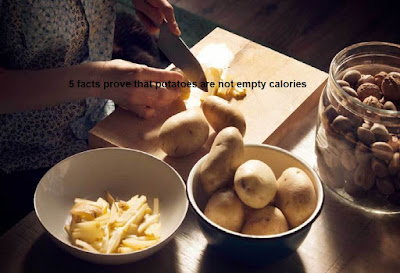5 facts prove that potatoes are not empty calories
5 facts prove that potatoes are not empty calories
What’s with all the haters on taters? It’s not hard to find anti-spud nutritional advice, and most potato opponents tend to spout the same problem: carbs.
True, potatoes are a starchy vegetable. Their carb content is higher than many other veggies, which can be an issue for people concerned about their blood sugar levels. One medium russet potato has about 37 grams of carbohydrates, compared to a serving of broccoli, which has 6 grams of carbs. Because of this starch stat, many experts recommend eating non-starchy vegetables instead, since they are lower in carbs and calories.
Another reason many experts are advising Americans to move away from the spud is simply because we eat so many of them. (It’s called a “meat and potatoes diet,” after all.) Worse, our potato obsession tends to come in the fried form of French fries, tater tots, and hash browns, or doused in butter or sour cream.
But let’s get one thing straight: Potatoes are not “empty carbs” or even empty calories. As part of a healthy diet and when eaten in proper portions and without tons of unhealthy toppings, potatoes boast these five health benefits.
1. Potassium (952 mg). The humble potato (with the skin on) is actually one of the best sources of potassium—more than double what bananas offer. (Here are other terrific sources of potassium.) Potassium counters the harmful effects of sodium to help you maintain a healthy blood pressure.
2. Magnesium (52 g). Magnesium plays many roles in health, such as regulating bodily functions, energy, and muscle contractions. In general, experts recommend 310 milligrams of magnesium daily for women aged 19 and up, and about 400 milligrams for men. (You can also try adding more of these high-magnesium foods to your shopping cart.)
3. Phosphorus (123 mg). This mineral is a major player in building strong bones and preventing dental problems, along with calcium. It also helps regulate the body’s energy supply, as well as kidney and nerve function.
4. Fiber (4 g). Just like non-starchy vegetables, the starchy spud is a great source of fiber, which regulates digestion and prevents constipation. (On the other hand, be sure to avoid these foods if you’re constipated.) Potatoes can also help with weight management since fiber can keep you feeling full longer and curb your appetite.
5. Protein (4.5 g). While you might think thick hamburgers and chicken breasts are the only way to meet your protein quota, you can actually reach the recommended 46-56 grams a day on a diet that’s more plant-based. One medium potato is a surprising 10 percent of your protein recommendation. (Here are other plant-based protein sources.)
Potatoes might be a bit starchier than your other favorites, but you don’t have to ban them completely. Avoid frying, adding high-fat dairy like butter or sour cream, or treating it as your go-to vegetable. As with all foods, variety is key. Empty calories? Think again.

